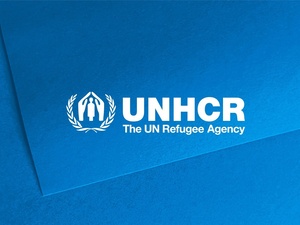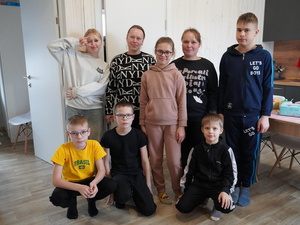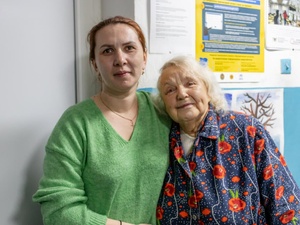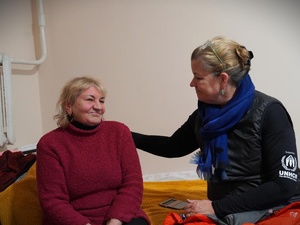Ukrainian worker pedals out of war zone

Ukrainian worker pedals out of war zone
Vasily Zubko hoped to the end he could stay in his beloved steppe country in eastern Ukraine, but as the conflict drew ever closer, he got on his bike and pedalled out of the war zone.
He covered half the distance to the Ukrainian capital, Kyiv, about 400 kilometres, through the autumn rain.
“It was November,” he says. “The first night I stayed in an Orthodox monastery, the second night with some Orthodox believers and the third night with people from our own (Pentecostal) Church. I got soaked.
“They saw I was catching cold and wouldn’t let me continue on the bike. They put me on the train to Kyiv.”
Vasily’s family were already in the Ukrainian capital. He had sent them to safety at the start of fighting in June 2014. He stayed on in the town of Kadiyivka, in the Luhansk region, because he was upgrading his skills in the factory where he worked as a lathe operator. He still hoped the conflict might come to an end.
"We could see it was going to end badly."
Vasily, 50, Marianna, 47, and their five youngest children are now settled in Gdansk, the Polish city that has set an example with a municipal programme to integrate refugees. Three grown-up children remain behind in Ukraine.
“Come in,” Marianna says, opening the door of the family’s rented house. She has just come home from a Polish language class.
Vasily is in the kitchen, making potato and mushroom pies.
“We had just bought a house and fixed up the kitchen when the war in Ukraine started,” says Marianna. “There was a power struggle and pickets on the streets.
“At first it wasn’t so bad, but then armed men turned up and it got frightening. When the shooting started, our house was damaged. We could see it was going to end badly.”
So far, more than 10,000 people have been killed and more than 1.6 million have been displaced in four years of conflict in eastern Ukraine.
Marianna and Vasily were separated for five months after she left for Kyiv and he stayed on in Kadiyivka.
“The war was getting worse. It was obvious it wasn’t going to end quickly,” Vasily says. “I began to see there was a danger I could get stuck in the east and we might be separated for a long time.”
"I knew he could do the distance."
He decided to leave on his bike, which would have involved covering 825 kilometres if he had cycled all the way to the capital.
Vasily was an experienced cyclist and, skilled in survival techniques, he lit fires and carried knives to defend himself from wolves, if necessary.
The bomb-cratered roads in November 2014 were dangerous in a different way.
“People leaving in cars were getting shot at,” he says. “I had to go through several checkpoints. When they asked me where I was going, I said the monastery at Sloviansk and they let me go. They must have thought 'just a pilgrim, something wrong with his head’. I went through and knew that God would help me.”
The place where he stayed was a small monks’ community on the road before the famous Sviatohirsk Lavra (Sviatohirsk Cave Monastery) in the Donetsk region. By the third night, Vasily reached the home of fellow Pentecostals in the Poltava region and from there took the train to Kyiv.
Marianna knew he was on the way. “He rang me. I knew he could do the distance, but it was cold and the roads were dangerous. I was worried, of course.”
Together again in Kyiv, the family were sleeping on friends’ floors and hoping for long-term accommodation. However, they found the Kyiv authorities, overwhelmed by arrivals from the east, slow in providing a solution. “A friend said ‘What have you got to lose? Why don’t you try Poland?’” says Marianna.
They travelled by train to Lviv and crossed into Poland, where they sought asylum. The Pentecostal network helped them to find temporary accommodation in the town of Godziszewo, near Gdansk.
“Our lives are here now.”
“We thought about going to Warsaw, but Dad said, ‘No, Gdansk is a port, there will be work for me there’,” says Marianna. Despite his fears that he spoke little Polish, Vasily soon found a job with a small Gdansk company that services bridges.
The Gdansk workforce welcomed him. “As soon as I was accepted at work, I felt at home,” he says.
The Zubkos’ children are doing well. Pavel, 21, is pursuing photography. David, 20, is attending evening classes. And Bogdan, 18, is at technical college. Dmitry, 16, and Tatyana, 15, are both at school. David and Bogdan are both skilled at drawing and hope to become artists.
The family were granted asylum in January 2017. “When we got a ‘yes’, the kids started to sing and dance,” says Marianna.
Soon afterwards, they moved into the house in Gdansk. They even have a cat. “Now we have our own place, we can allow ourselves a cat,” says Marianna.
Vasily does not have a bicycle in Poland. He has not cycled for three years and says his leg muscles are not what they used to be. He misses Ukraine, too. His heart aches for the nightingales, horses and wildflowers of the steppe.
The children’s futures are the priority and the youngsters are adamant they want to stay in Poland. Says Dmitry: “Our lives are here now.”









